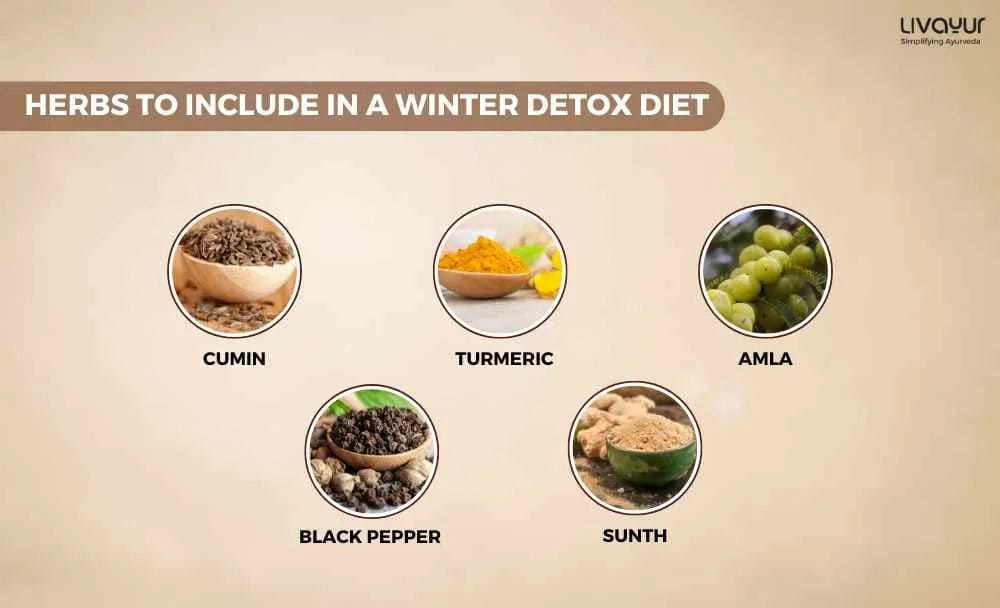The importance of detoxification is something that is clearly highlighted in Ayurveda and this has become increasingly relevant today. This is because of our fast-paced and urban lifestyles with highly processed diets that cause a significant build-up in toxicity levels. The presence of toxins in the human body is described as Ama in classical texts, making Ayurveda the world’s oldest medical science to recognize the threat of toxicity. While toxins can pose a threat at any point of time, making detoxification important, the practice takes on even greater significance during winter. This is because winter is associated with a predominance of the Kapha Dosha, which causes sluggishness and heaviness in the body, as well as weakening of Agni – this combination results in slowed metabolism and weakened digestion. This doesn’t just increase the risk of weight gain, but it also results in a greater accumulation of toxins or Ama in the body. This is why Ayurveda stresses the importance of winter detox programmes.
Ayurvedic Detox In Winter
Ayurvedic Detox Diet
Obviously the most important element of any detox programme is a detox diet. In Ayurveda, effective detoxification requires a number of modifications to one’s diet. These include:
- Reduced intake or avoidance of foods such as leftovers, packaged and processed foods, frozen foods and foods containing chemical additives. These foods increase the build-up of ama and will be counterproductive.
- Focus on foods that help to eliminate Ama. This means eating mainly vegetarian meals that are light and should be consumed warm or hot. Leafy green vegetables, soups, Dals, vegetables, whole grains, nuts and seeds are all good choices, but they should be cooked and not consumed raw. Foods with bitter flavours are particularly helpful for detoxification.
- Make it a point to include heating herbs like turmeric, cumin, Amla, Sunth, Punarnava and black pepper in your meals as this will help to strengthen the digestive fire and facilitate the elimination of Ama from the body.
- Ayurvedic detox drinks that contain herbs and spices such as turmeric, ginger and Amla can be especially helpful, ensuring adequate hydration, while providing detox benefits. Most Ayurvedic detox drinks drinks are consumed in the form of herbal teas, but you may also consume Ayurvedic herbal decoctions called Kadhas.
Activities for Detox
While dietary modifications are the first step towards an effective detox in winter, physical activity is also regarded as important. Make sure to follow these practices:
- Counter the sluggishness and heaviness of Kapha with increased stimulation through exercising. Ideally, you should start your day with an exercise session to build-up and maintain energy levels through the course of the day.
- Yoga is an ideal choice of physical activity because of its calming effects on the mind and body. There are also specific Yoga asanas that can be practised in winter to help balance both Vata and Kapha Doshas.
- Avoid over-exercising or engaging in activities that involve exposure to extreme cold and dry weather conditions as these can exacerbate problems of Vata and Kapha aggravation.
Self-Care Practises
Ayurvedic self-care practises to support a winter detox don’t just include practises that can be engaged at home, but also includes therapeutic treatments that can be obtained at Ayurvedic spas and retreats. Some such winter detox practices include:
- Self-massage or Abhyanga with heated oils as this promotes circulation within the body, facilitating the elimination of toxins through sweat and urine. Ayurvedic massage oils containing herbs like Ashwagandha, ginger, turmeric and Triphala are known to be particularly effective.
- Panchakarma therapy is perhaps the most important and effective of all Ayurvedic detox drinks practises and can be administered at any Ayurvedic retreat or spa. This involves five different treatments, all aimed at reducing toxicity and purifying or cleansing the body.
- Daily meditation is another important practice as it helps to build your focus, clearing clutter and distractions from your mind, making it easier to stay focused and disciplined with other lifestyle changes.
While these are just some of the features of an Ayurvedic detox drinks programme for winter, this is not a comprehensive plan. It is advisable that you speak to an Ayurvedic physician for a customised detox plan based on your unique balance of Doshas and health status.


















